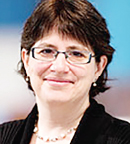IN AN EFFORT to find new strategies to personalize treatment for pediatric patients, Seattle Children’s Hospital has opened the first clinical trial applying next-generation T-cell receptor (TCR) sequencing and single-cell gene expression analysis to better understand how the immune system drives both inflammatory bowel disease in pediatric autoimmunity patients and graft-vs-host disease in pediatric bone marrow transplant patients.
The PREDICT (Precision Diagnostics in Inflammatory Bowel Disease, Cellular Therapy, and Transplantation) trial is expected first to provide clinicians new information about why inflammatory bowel disease arises in children, allowing them to tailor treatment plans to each patient. The trial will later expand to include bone marrow transplant patients, with the goal of identifying the immunologic changes that occur when a patient develops graft-vs-host disease.

Leslie Kean, MD, PhD
“PREDICT seeks to change the paradigm of treatment by first changing the paradigm of diagnosis,” said Leslie Kean, MD, PhD, the trial’s principal investigator and Associate Director of the Ben Towne Center for Childhood Cancer Research at Seattle Children’s Research Institute. “By gaining foundational molecular diagnostic knowledge about a patient’s T cells, we hope to ultimately discover better treatment approaches for inflammatory bowel disease and graft-vs-host disease.”
Trial Details
AS PART OF THE TRIAL, Dr. Kean and her team will perform TCR sequencing and gene-expression analysis on samples collected from 100 inflammatory bowel disease and 250 bone marrow transplant patients. The data resulting from the initial and follow-up analyses will help researchers pinpoint molecular pathways active within a patient’s T cells, which could serve as therapeutic targets in future studies.
The researchers will collaborate with Adaptive Biotechnologies by implementing its immunoSEQ platform for high-throughput TCR sequencing and conducting TCR-repertoire analyses. The single-cell gene-expression analysis will be performed using the Chromium Single Cell 3′ Solution supplied by 10x Genomics, which will enable gene-expression patterns to be discovered in each patient’s individual T cells.
Over the next 2 years, Dr. Kean will work in partnership with transplant, gastroenterology, and immunology physicians first to enroll inflammatory bowel disease patients who are undergoing their diagnostic evaluation and treatment at Seattle Children’s and then to open the bone marrow transplant cohort later this year.
Bridge Between Bowel and Bone Marrow
GRAFT-VS-HOST disease occurs when the T cells of newly transplanted bone marrow begin to attack a patient’s tissues, including those of the skin, liver, and intestines. The impact to the gastrointestinal tract can be extremely difficult to overcome. In patients with inflammatory bowel disease, a similar pathogenesis is observed, where components of the immune system, including T cells, react abnormally over time, causing chronic inflammation in the digestive system.
Standard treatments aimed at suppressing or modulating the immune response are often ineffective in managing diseases such as inflammatory bowel disease and graft-vs-host disease. In both cases, there is a need for new, targeted therapies able to prevent or treat the diseases without causing side effects.
“Inflammatory bowel disease and graft-vs-host disease have a lot more in common than meets the eye when it comes to the underlying immune response they trigger,” said Dr. Kean. ■

